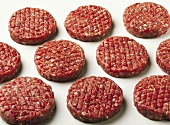If ever there were a case for artisan vs. industrialized food production, the meat packing industry is it.
In the summer of 2008 an outbreak of listeria resulted in 23 deaths across the country. You all remember the Maple Leaf debacle, right? That was only one of over 90+ instances of meat and poultry contamination that resulted in a food recall that year. And it’s not getting any better.
- Regulations that require all meat be processed in a relatively small number of licensed abattoirs in the country
- Huge meat packing plants processing up to 1,000 cows per day
- Those cows come from all over the world
- The cows are mechanically processed, making for less control over the meat’s contact with feces
- Individual products may be made up of meat from many different animals
- And forget food safety regulations, they aren’t being enforced
Basically, current meat processing practices mean we’re playing a high risk game of cross-contamination Russian roulette, with potentially deadly results.
Read more at How Effective is Canada’s Meat-Inspection System? from The Georgia Straight and tell me if it doesn’t affect your decisions around eating meat (including pork and chicken). Especially processed meats.
Here’s the crazy thing. There are good arguments for smaller, locally run abattoirs:
- Greater control over which animals are processed through the plant and where they are from
- Animals have to travel shorter distances and are less like to become stressed and ill (which goes hand in hand)
- It’s easier to locate and contain the source if a contamination issue does arises
- A better track record for cleanliness
As it stands now, even if you buy humanely raised beef and chicken, artisan farmers must have them processed in industrialized packing plants so you’re still at risk.
Hmmm, it might be time to re-evaluate vegetarianism, simply as a matter of basic food safety.


